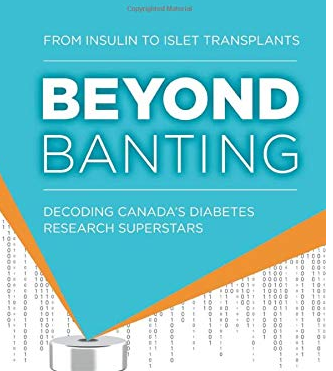
By Krista Lamb
Share in an evening of storytelling and science in honour of this life-saving discovery
On April 14, 2021 from 4:30 to 8:15 p.m. ET, the Banting & Best Diabetes Centre, Diabetes Action Canada, and the University of Toronto Department of Medicine will bring together a diverse group of speakers to share their stories about how the discovery of insulin has changed their lives for the better.
Open to everyone, this virtual event, 100 Years of Insulin: Celebrating its impact on our lives, will highlight the latest advances related to insulin, as well as the stories of those who are alive today because of this discovery.
“Toronto is understandably proud of its role in the discovery of insulin, which took place here at the University of Toronto,” says Dr. Gary Lewis, Director of the Banting & Best Diabetes Centre and Scientific Co-Lead for Diabetes Action Canada. “We are thrilled to be able to celebrate virtually with friends and colleagues from across Canada thanks to the generous support of our sponsor, Sun Life. I hope that all those who attend will leave inspired by the work being done in this country to further the legacy of Banting, Best, Collip and Macleod.”
Topics covered at the celebration will include, diabetes through an Indigenous lens, the importance of having people living with diabetes involved in the research process, new developments in diabetes treatment, and how to thrive with diabetes. In addition, Canada Post will unveil its newest commemorative stamp to mark the 100th anniversary of the discovery of insulin.
“Every day of my professional career as a diabetes specialist I am privileged to help people use insulin in the best possible way to live healthy, active lives,” says Dr. Jacqueline James, Department of Medicine Division Director, Endocrinology and Metabolism at the University of Toronto. “At this event attendees will learn about the many ways that current approaches have improved how insulin is used today, and what is hoped for the future.”
This free, public celebration has been generously supported by Sun Life. They are a leader in supporting diabetes awareness, prevention and care in Canada. Sun Life has a long history of supporting health and wellness and their commitment to improving the lives of people living with diabetes.
This event is one of many that will be held as part of the celebration of the 100th anniversary of the discovery of insulin. On April 15th and 16th the University of Toronto’s Scientific Symposium will provide comprehensive updates on the latest advances in diabetes treatment and management through a series of online educational sessions and live, online, panel discussions with the experts from around the world. In addition, numerous other partner events will take place throughout the year.
The full agenda for the public celebration is available here.
Register now to secure your place!
About Diabetes Action Canada:
Diabetes Action Canada is a Canadian research organization that was launched in 2016. It is funded jointly by the Canadian Institutes of Health Research’s (CIHR) Strategic Patient-Oriented Research (SPOR) program, non-profit organizations, and private sponsors. The Network focuses on bringing people with diabetes, their caregivers and researchers together to identify the health concerns of those living with diabetes and to co-create research projects that address these concerns. Diabetes Action Canada partners and collaborate with university research teams across Canada, non-profit organizations, and provincial governments to plan, execute and evaluate these research projects so we can improve patient outcomes and experiences.
About the Banting & Best Diabetes Centre:
The Banting & Best Diabetes Centre (BBDC) was established in 1978 as an extra-departmental unit of the Faculty of Medicine, University of Toronto with the primary objective of advancing diabetes research, education, and patient care. It now has a network of over 200 faculty and health care providers involved in diabetes research, education and care from various departments at the University of Toronto and its affiliated hospitals and research institutes. The BBDC offers several grants, studentships, fellowships, and other support for qualified individuals involved in diabetes research at the University of Toronto and its affiliated hospitals and research institutes. It also hosts scientific conferences to facilitate the exchange of scientific information and ideas, and to assist in the development of collaborative diabetes research activities both locally and internationally. The Centre also develops continuing health education and quality improvement initiatives for all members of the diabetes health care team.
About the University of Toronto Department of Medicine:
The Department of Medicine at the University of Toronto is one of the oldest departments of its kind in North America, dating back to the founding of the School of Medicine in 1843. A major milestone in the department’s history was the establishment of the Sir John and Lady Eaton Professorship of Medicine in 1919; the first endowed chair in clinical medicine in what was then the British Empire. Now, the Department of Medicine is one of the largest in North America, with 800 full-time faculty members, 1,000 postgraduate trainees, and 20 sub-specialty divisions. One third of Canada’s, and one half of Ontario’s, internal medicine specialists received their training here. The Department of Medicine is also a research powerhouse with $162+ million annual research funding. Our research generates new knowledge with the goal of meaningfully impacting internal medicine training and the care and health outcomes of patients and their families.

















